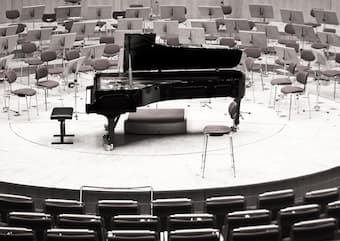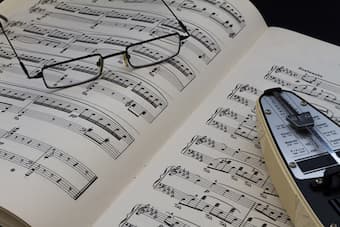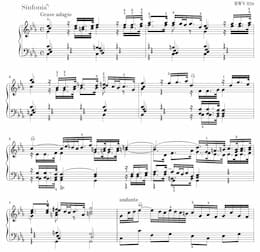 As a piano lover interested in getting started or as a piano learner, you have probably heard about the grade examinations offered by ABRSM or Trinity College. Praised by some and criticised by others, they are undoubtedly a well-known topic among piano students and teachers. Depending on how you approach them, the grade examinations can either provide you with a fantastic structure or turn into a handicap in disguise. As a master piano teacher, I encourage my pupils to sit the grade examinations but I always ensure that they understand how to approach them correctly. Let’s have a look at the pros and the cons.
As a piano lover interested in getting started or as a piano learner, you have probably heard about the grade examinations offered by ABRSM or Trinity College. Praised by some and criticised by others, they are undoubtedly a well-known topic among piano students and teachers. Depending on how you approach them, the grade examinations can either provide you with a fantastic structure or turn into a handicap in disguise. As a master piano teacher, I encourage my pupils to sit the grade examinations but I always ensure that they understand how to approach them correctly. Let’s have a look at the pros and the cons.
Pros No. 1 – It provides you with a structure
The grade examinations are fantastic as they provide you with a structure and help balance your education equally between technical exercises, sight-reading and piano pieces. Without this solid structure, you could be tempted to let aside the technical aspects of piano playing and give too much importance to joys of playing piano repertoire. We all know that playing a lovely piece of music is more enjoyable than practising exercises and sight-reading, but if these last two skills are not studied regularly, you will, over time, increase the gap between these various aspects of piano playing. You will become an unbalanced piano player who could perform some lovely pieces, but without a strong foundation, you will never become the pianist of your dreams! This approach may be fine during the early stages of your piano studies, but it will soon come back and bite you, creating several issues in your overall piano playing.
Pros No. 2 – You now have an objective and a deadline
 All professional pianists practise with the intention and vision of performing in the near future. There is always a reason to sit at the piano and work on a piano piece. It can either be for a concert or a competition. Practising without an objective could feel pointless as there is no opportunity to perform and share your fantastic work with an audience. It is equivalent for tennis players who train for the Grand Slam or athletes for the next Olympic Games. As you can sit the grade examination four times a year (in March, June, September and December), you often have the opportunity to pass the exam and you do not have to wait too long before demonstrating your skills and get rewarded for your hard work.
All professional pianists practise with the intention and vision of performing in the near future. There is always a reason to sit at the piano and work on a piano piece. It can either be for a concert or a competition. Practising without an objective could feel pointless as there is no opportunity to perform and share your fantastic work with an audience. It is equivalent for tennis players who train for the Grand Slam or athletes for the next Olympic Games. As you can sit the grade examination four times a year (in March, June, September and December), you often have the opportunity to pass the exam and you do not have to wait too long before demonstrating your skills and get rewarded for your hard work.
Pros No. 3 – You can always refer to it to describe your piano abilities
Another quality of the grade examinations is its international recognition and its notoriety amongst musicians and music enthusiasts. If someone relatively knowledgeable in music asks you if you are a good pianist, you can simply tell this person which grade you have just passed and he or she will immediately know what standard you are at.
Pros No. 4 – It gives you a real sense of accomplishment and help you monitor your progress
 Throughout my career as a piano teacher, I have often seen that my beginner and intermediate students were not able to appreciate their progress. They would focus on what they have not achieved yet and do not seem to realise that they have already come a long way. Thanks to the grade examinations, you can monitor your progress and get a certificate that proves that you have reached a certain standard of piano playing. As for the judokas who can evaluate their level of competency through a belt rank, you can also gauge your progress by understanding that there are 8 grades in total. It can give you an idea of where you are at and what your destination is. I believe that the grade examinations are a fantastic guide to accompany you through your piano studies. If understood and used correctly, it provides you with the necessary support to structure your piano learning. However, this amazing tool could turn into an obstacle if used in the wrong way.
Throughout my career as a piano teacher, I have often seen that my beginner and intermediate students were not able to appreciate their progress. They would focus on what they have not achieved yet and do not seem to realise that they have already come a long way. Thanks to the grade examinations, you can monitor your progress and get a certificate that proves that you have reached a certain standard of piano playing. As for the judokas who can evaluate their level of competency through a belt rank, you can also gauge your progress by understanding that there are 8 grades in total. It can give you an idea of where you are at and what your destination is. I believe that the grade examinations are a fantastic guide to accompany you through your piano studies. If understood and used correctly, it provides you with the necessary support to structure your piano learning. However, this amazing tool could turn into an obstacle if used in the wrong way.
Cons No. 1 – The obsession
 Being obsessed with grade examinations can be very dangerous. Instead of supporting you throughout your musical journey, it can have the opposite effect and take you in the completely wrong direction. You might not believe it but I have had a couple of piano pupils who gave more importance to their exam result than to the art of piano playing. It is honestly heartbreaking and devastating to meet people who only swear by their piano exams! It can go so far that they lose interest in what piano playing is all about to focus exclusively on the requirements of the grade examinations. One of my pupils could not memorise the name we give to eighth notes in British English. He was not interested in remembering that they were called “quavers” since knowing this denomination was not a requirement for the grade 2 exam. Another form of obsession is the profound desire to get to the final grade as soon as possible as if piano playing was a race against the clock. You would not believe how many times I have heard these questions: “How long will that take me to get to grade 8?”, “Can I sit more than one grade a year if I practise a lot?” Being ambitious is wonderful but wanting to complete all the grades in the shortest period possible is ridiculous! Once again, piano playing is an art and not a task to be completed with a sense of urgency.
Being obsessed with grade examinations can be very dangerous. Instead of supporting you throughout your musical journey, it can have the opposite effect and take you in the completely wrong direction. You might not believe it but I have had a couple of piano pupils who gave more importance to their exam result than to the art of piano playing. It is honestly heartbreaking and devastating to meet people who only swear by their piano exams! It can go so far that they lose interest in what piano playing is all about to focus exclusively on the requirements of the grade examinations. One of my pupils could not memorise the name we give to eighth notes in British English. He was not interested in remembering that they were called “quavers” since knowing this denomination was not a requirement for the grade 2 exam. Another form of obsession is the profound desire to get to the final grade as soon as possible as if piano playing was a race against the clock. You would not believe how many times I have heard these questions: “How long will that take me to get to grade 8?”, “Can I sit more than one grade a year if I practise a lot?” Being ambitious is wonderful but wanting to complete all the grades in the shortest period possible is ridiculous! Once again, piano playing is an art and not a task to be completed with a sense of urgency.
Cons No. 2 – Divergence and inequality
 Even though the committee has undoubtedly done a fantastic job in putting the curriculum together, there are some divergences between the pieces and technical exercises, and unequalled difficulties from a piece to another. The grade examinations are made of three pieces of different styles chosen from a given list. Depending on your selection, you will not necessarily be exposed to the same type of difficulty. I also found the technical exercises that only include simple scales and arpeggios far too easy in relation to the skills required to perform the piano pieces. Let’s have a look at the selection of pieces for the years 2019/2020. In Minuet in C by William Duncombe, the pianist must play repeated double notes which represent a technical difficulty only approached in the grade 7 syllabus. Also, Theme by Thomas Attwood requires a good dexterity on the left hand which is far too demanding for piano learners who are only supposed to play scales slowly hands separately. Happy Day by Ian King is a great jazz piece that has been hugely popular amongst the grade 1 piano pupils. However, it requires a feel for jazz and the application of swing playing which is far beyond the abilities of a beginner. I have taught this piece several times with great difficulty since some students were still struggling to perform quavers steadily and heavenly. Who Said Mice? by Last is surely a fantastic piece for piano learners to practise sound production, legato/staccato playing and using a large range of dynamics. However, it is quite a lot to ask people who are still new to piano playing.
Even though the committee has undoubtedly done a fantastic job in putting the curriculum together, there are some divergences between the pieces and technical exercises, and unequalled difficulties from a piece to another. The grade examinations are made of three pieces of different styles chosen from a given list. Depending on your selection, you will not necessarily be exposed to the same type of difficulty. I also found the technical exercises that only include simple scales and arpeggios far too easy in relation to the skills required to perform the piano pieces. Let’s have a look at the selection of pieces for the years 2019/2020. In Minuet in C by William Duncombe, the pianist must play repeated double notes which represent a technical difficulty only approached in the grade 7 syllabus. Also, Theme by Thomas Attwood requires a good dexterity on the left hand which is far too demanding for piano learners who are only supposed to play scales slowly hands separately. Happy Day by Ian King is a great jazz piece that has been hugely popular amongst the grade 1 piano pupils. However, it requires a feel for jazz and the application of swing playing which is far beyond the abilities of a beginner. I have taught this piece several times with great difficulty since some students were still struggling to perform quavers steadily and heavenly. Who Said Mice? by Last is surely a fantastic piece for piano learners to practise sound production, legato/staccato playing and using a large range of dynamics. However, it is quite a lot to ask people who are still new to piano playing.
Minuet in C by Duncombe
Theme by Attwood
Happy Day by Ian King
Who Said Mice? by Last
Cons No. 3 – The syllabus is not always exciting and bore piano learners who were originally enthusiastic
Once again, I must congratulate the committee for their selection. Despite the size of the piano repertoire, they are excellent at finding lovely pieces that fit certain criteria. However, I have noticed a despondency from students who diligently sat one to three grades but wanted to get away from it due to the dullness of the piano pieces. It was always a shame since the students also lost interest in practising their technical exercises and sight-reading. As discussed at the beginning of my article, the grade examinations surely provide students with a strong structure, but it is sadly not always appropriate for adults who play for pleasure. They somewhat feel at school and could tend to lose their excitement and motivation.
Cons No. 4 – Beware! Your success does not necessarily reflect your true abilities
Sitting the grade exams will unquestionably give you an idea of your level of competency but will it reflect and reveal the pianist you really are? It is debatable… I have often discussed this issue with one of my long-lasting student with whom I share the same opinion on the matter. As explained earlier, the participants can select three piano pieces that they can practise for as long as they wish to, and polish over and over again until perfection, under the scrutiny of their piano teacher. It could result in the pianist not be able to play anything else and be compared to a parrot who can, however, very successfully perform the pieces practised a hundred times.
I believe that it can all be summarised by two or three sentences: I greatly encourage you to sit the grade examinations but take it with a pinch of salt since exams are not everything!
 For more of the best in classical music, sign up to our E-Newsletter
For more of the best in classical music, sign up to our E-Newsletter
Founder of The London Piano Institute, S&C Piano Instruction and l’Institut de Musique de Paris, Celine Gaurier-Joubert is a concert pianist and one of the world’s leading experts on piano education for adults.

